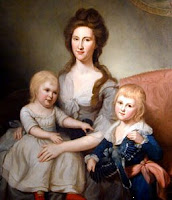Summarize Jefferson's First Inaugural Address
Paragraphs:
1.) Jefferson starts out by being humble about the fact that he has been elected to a great place of power, admitting that this role was above his talents, but would work hard to help the country reach its greatest potential, under his governing. He also stated that he would govern the people according to the Constitution and refer to it under any circumstances.
2.) He then moves on to the rights of the people. He points out that the nation will be governed according to the rules of the Constitution and that the people will unite in common efforts for the common good. Also, the will of the majority was to prevail in all cases, but the minority would have equal rights protected by equal laws and any violation of those laws would be considered oppression. He also points out that religious freedom was of great importance, and that "every difference of opinion is not a difference of principle." He also claims his belief that Federalism/Republicanism is the strongest government on earth.
3.) Jefferson then discussed how Federal and Republican principles are their "attachment to union and representative government." He also said that America had benefits from being naturally separated from other countries (by oceans, etc.), and would be able to keep their principles strong, without the presence of degradations of others. He also stated various blessings that the country possesses, such as freedoms and rights as well as being united as one nation. He believed that much more good would come from their good government.
4.) He moves on to discussing the most essential properties and principles of the government, specifically stating that it was not limited to these:
- Equal and exact justice to all men (no matter what their standing be, religiously or politically)
- Peace
- Commerce
- Honest friendship with all nations (entangling alliances with none)
- The support of State governments in all their rights
- The preservation of general government (in its whole, Constitutional vigor)
- A jealous care of the right of election by the people
- Absolute acquiescence in the decisions of the majority (the vital principle of the Republics)
- A well-disciplined militia (keep the peace)
- Supremacy of the civil over the military authority
- Economy in the public expense
- Honest payment of debts
- Sacred preservation of the public faith
- Encouragement of agriculture
- Diffusion of information and arraignment of all abuses at the bar of the public reason
- Freedom of religion
- Freedom of the press
- Freedom of the person under habaes corpus
- Trial by juries impartially selected
+&+sons.+Maryland+Historical+Society..jpg)
